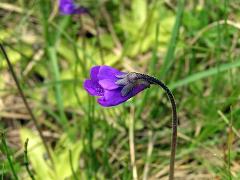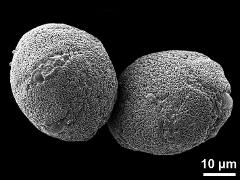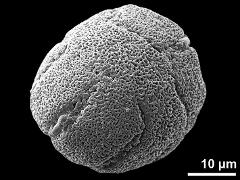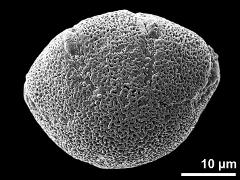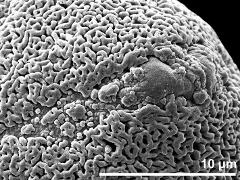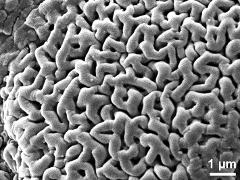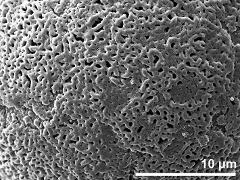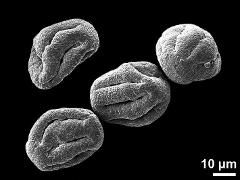Pinguicula vulgaris
Taxonomy: Spermatophyta, Scrophulariales, Lentibulariaceae, Pinguicula
Published: 2005-06-01
Pollen Description
Shape, Size and Aperture
pollen unit: monad, dispersal unit and peculiarities: monad, size (pollen unit): medium-sized (26-50 µm), size of hydrated pollen (LM): -, shortest polar axis in equatorial view (LM): -, longest polar axis in equatorial view (LM): -, shortest diameter in equatorial or polar view (LM): -, longest diameter in equatorial or polar view (LM): -, pollen class: colporate, polarity: isopolar, P/E-ratio: oblate, shape: -, outline in polar view: circular, dominant orientation (LM): -, P/E-ratio (dry pollen): prolate, shape (dry pollen): -, outline in polar view (dry pollen): lobate, infoldings (dry pollen): aperture(s) sunken, aperture number: >6, aperture type: colporus, aperture condition: colporate, aperture peculiarities: -
Ornamentation and Structure
LM ornamentation LM: -, nexine: -, sexine: -, SEM ornamentation SEM: reticulate, suprasculpture SEM: -, TEM tectum: semitectate, infratectum: -, foot layer: -, endexine: -, intine: -, wall peculiarities: -, supratectal element: -
Miscellaneous
pollen coatings: absent, reserves in cytoplasm: -, cell number: -, Ubisch bodies: absent
Annotations: Number of apertures 6, 7, or more; apertures often irregularly arranged and anastomosing
Author(s) of diagnosis: Svojtka, M.; Halbritter, H.
Pictures
Picture legend
- flower(s), photographer: Svojtka, M.
- hydrated pollen grains - fresh, rehydrated (water) & critical point dried & sputter coated with gold, photographer: Halbritter, H.
- polar view (oblique) - fresh, rehydrated (water) & critical point dried & sputter coated with gold, photographer: Halbritter, H.
- equatorial view (oblique) - fresh, rehydrated (water) & critical point dried & sputter coated with gold, photographer: Halbritter, H.
- aperture - fresh, rehydrated (water) & critical point dried & sputter coated with gold, photographer: Halbritter, H.
- exine surface - fresh, rehydrated (water) & critical point dried & sputter coated with gold, photographer: Halbritter, H.
- polar area - fresh, rehydrated (water) & critical point dried & sputter coated with gold, photographer: Halbritter, H.
- dry pollen grains - dry, sputter coated with gold, photographer: Halbritter, H.
Literature
- (1984) A practical pollen guide to the British flora. Quaternary Res Bull Technical Guide I: 1-139
- (1975) Morphological criteria for specific identification of pollen of some representatives of Jakutia. In: Palynological materials to the Stratigraphy of the sedimentary rocks of Jakutia. Jakutia branch siberian Section AN SSSR, Jakutia : 113-129
- (1942) Lehrbuch der Pollenanalyse. Handbücher der praktischen Vorgeschichtsforschung. Verlag Ferdinand Enke, Stuttgart 3: 195 pp
- (1987) Atlas polínico de Andalucía occidental. Inst de Desarrollo Regional 43, Univ de Sevilla
- (1952) Pollen morphology and plant taxonomy. Angiosperms. Almquist & Wiksell, Stockholm
- (1961) An introduction to a scandinavian pollen flora. Grana Palynologica 2: 3-92
- (1963) An introduction to a scandinavian pollen flora - II. Almquist & Wiksell, Uppsala : 1-89
- (1964) Text book of pollen analysis. Scandinavian University Books, Munksgaard : 1-237
- (1890) Beiträge zur vergleichenden Morphologie der Pollenkörner. Breslau (Thesis) : 1-72
- (1971) Pollen and Spores of Chile. Univ Arizona Press, Tucson : 1-167
- (1956) Pollen grains of Japan. Hirokawa Publishing Co, Tokyo I-XII: 1-304
- (1988) Pollen: Illustrations and Scanning Electronmicrographs. Kodansha (Tokyo) & Springer-Verlag : 198 pp
- (1970) Lentibulariaceae. Bull Ind Nat Sci Acad 41: 290-297
- (1978) Pollen dicotyledonearum Florae Partis Europaeae USSR. Lamiaceae - Zygophyllaceae. Nauka, Akad Sci USSR, VL Komarov Inst Bot : 184 pp
- (1927) Atlas und Bestimmungsschlüssel zur Pollenalytik. Bot Arch 19: 380-499, 50 pl
- (1834) Über den Bau und die Formen der Pollenkörner. Beiträge zur Anatomie und Physiologie der Gewächse. Erstes Heft. Bern 4: 130 pp, 6 pl
- (1835) Sur la structure et les formes des graines de pollen. Ann Sci Nat, Ser 2 3: 148-180, 220-236, 304-346
- (1991) Pollen analysis. Blackwell Scientific Publications. Second Edition : 216 pp
- (1976) Flora und palynomorphs of Alaska. Orion Press, Tokyo : 367 pp
- (1980) Diagnostic characters of pollen grains of Japan - I & II. Spec Publ Osaka Mus Nat Hist 12: 157 pl
- (1980) Diagnostic characters of pollen grains of Japan - I & II. Spec Publ Osaka Mus Nat Hist 13: 91 pp
- (1961) Pollen. Talleres graficos DCP, Gerona
- (1992) Pollen et spores d'Europe et d'Afrique du Nord. Laboratoire de Botanique historique et Palynologie, Marseille : 520 pp, 446 pl
- (1990) Descripción polínica de táxones del sureste peninsular (1). In: Polen, esporas y sus aplicaciones. VII Simposio de Palinologia Granada : 299-306
- (1967) Introduction to sporo-pollinique analysis. Nauka, Publishing House, Moscow : 1-270
- (1975) Pollen morphology of the Japanese species of Utricularia L. and Pinguicula L. with notes on fossil pollen of Utricularia from Japan (1-2). J Jap Bot 50: 164-179, 193-208
- (1965) Kartoteka Palynologiczna Roslin Polskich. Opolskie Towarzystwo Przyjaciol Nauk, Zeszyty Przyrodnicze 5: 31-50
- (1966) Illustrierte Flora von Mitteleuropa. Gustav Hegi 6: 2
- (1968) Palynologische Untersuchungen betreffend die Familien Polemoniaceae, Hydrophyllaceae und Lentibulariaceae aus der Flora Rumäniens. Rev Roum Biol Bot 13: 151-157
- (1990) Monografia polenului florei din România. Editura Academiei Române III: 98 pp, 94 pl
- (1983) Palynomorphs of Japanese Alpine plants - I. In: Ecosystem analysis in the alpine belt in the Central mountain region of Japan, II. Fac Liberal Arts, Shinshu Univ : 16-34
- (1990) Sobre la palinológia de algunas especies endemicas e interesantes de Andalucia oriental. Acta Botánica Malacitana 15: 353-365
- (1981) Palynological observations of insectivorous plants. Jap J Palynol 27: 67-78
Copyright and Citation
Cite this publication as:
Svojtka M., Halbritter H. 2005. Pinguicula vulgaris. In: PalDat - A palynological database. https://pc8.botanik.univie.ac.at/pub/Pinguicula_vulgaris/112863;jsessionid=13B544F1A634A09BB02AA2BE0FB74ED3; accessed 2025-07-03

